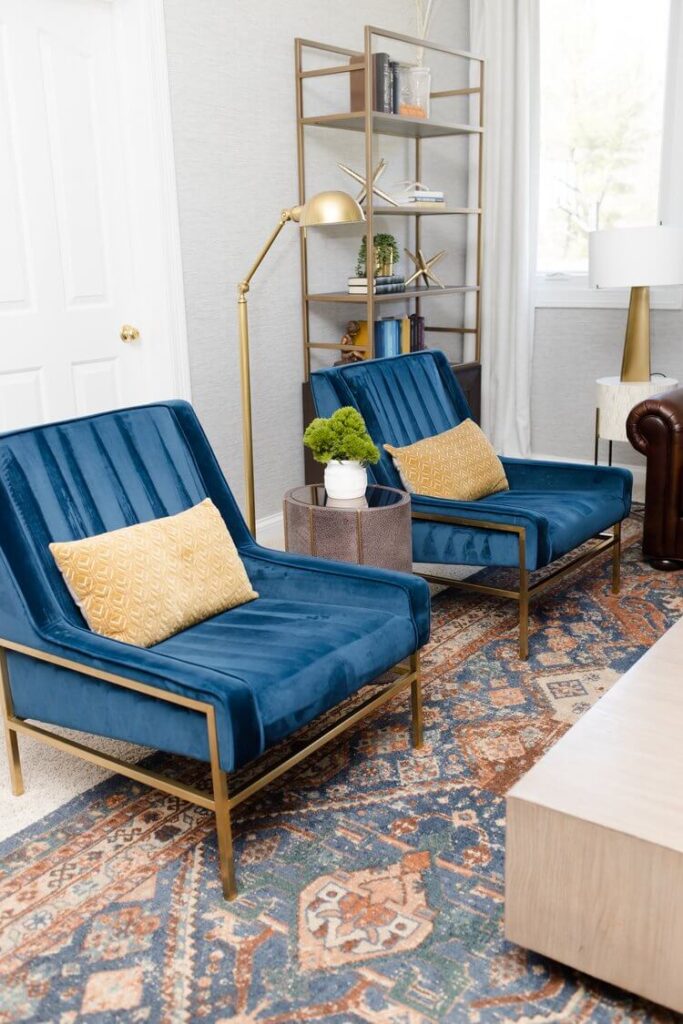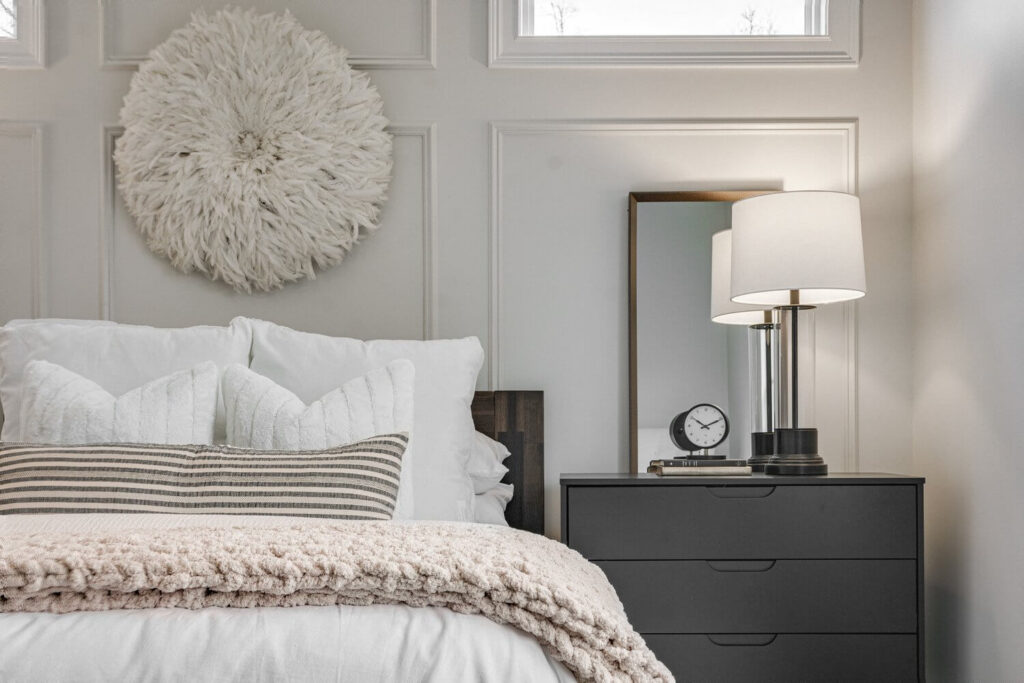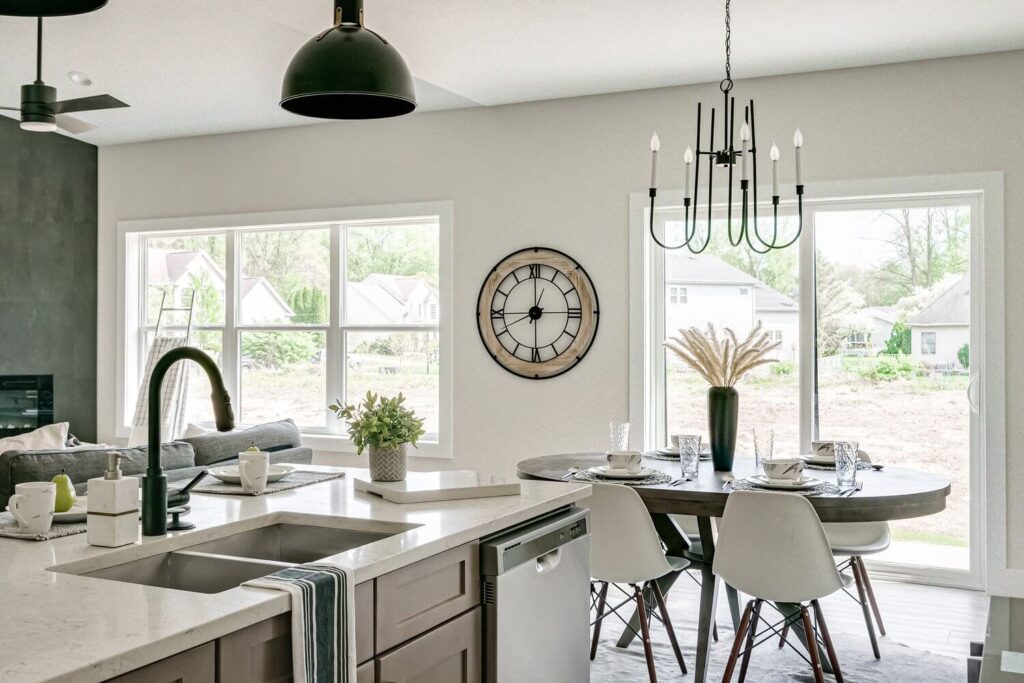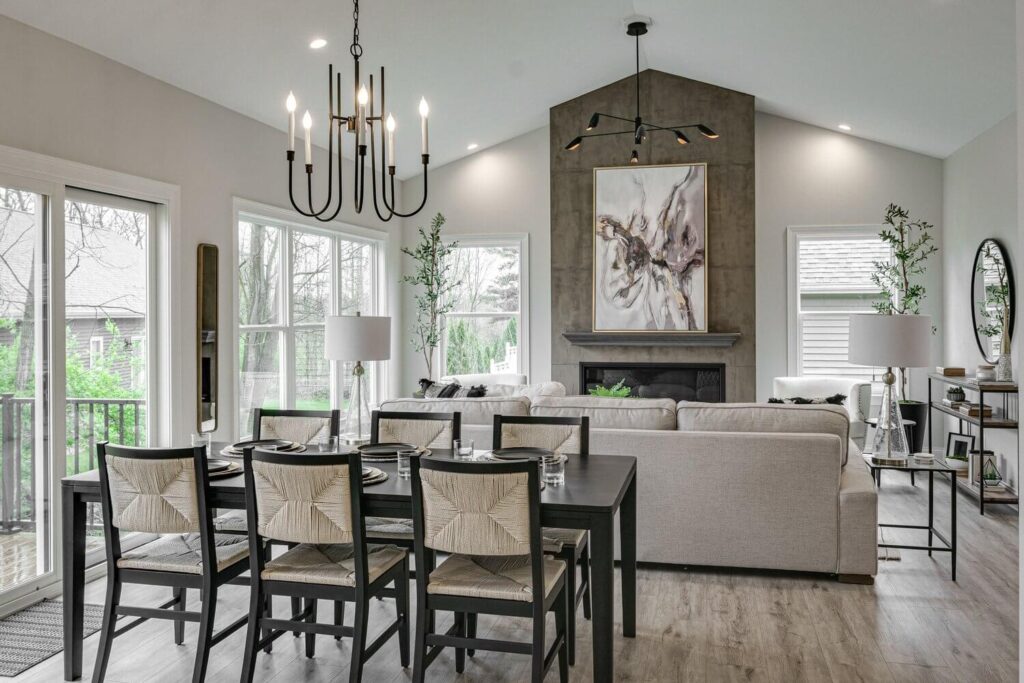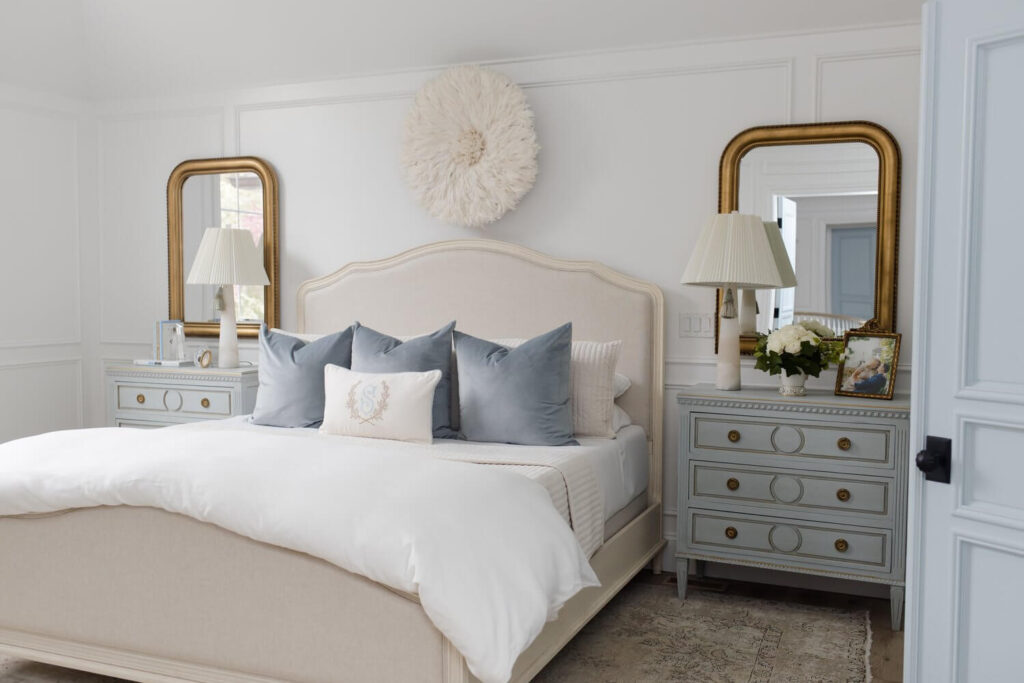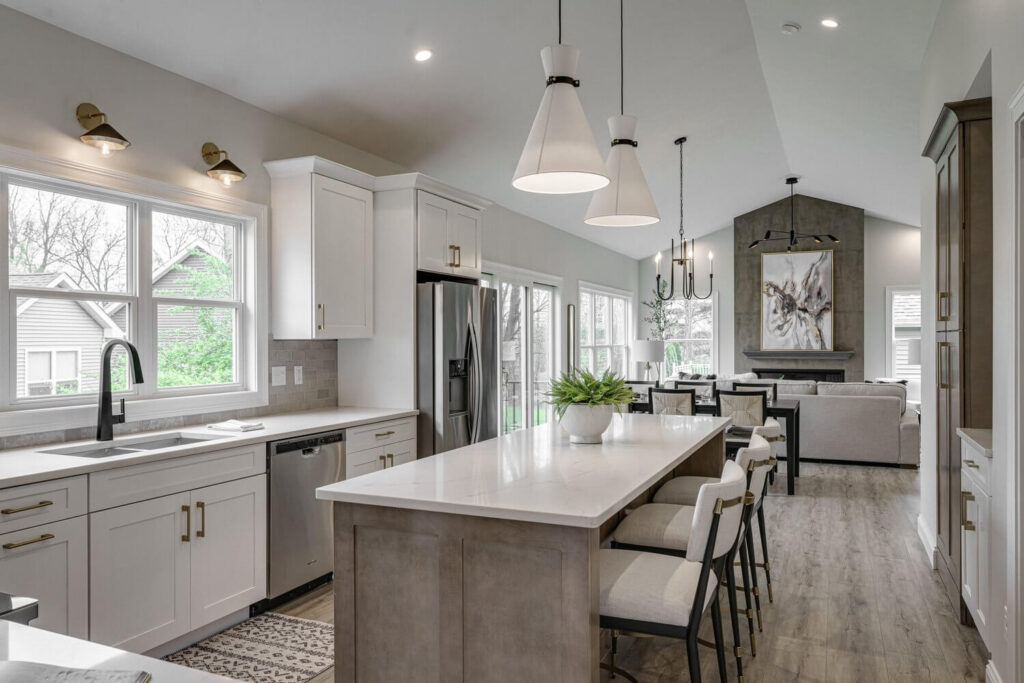RESA® member Vanessa Smith is the owner and principal designer at Flourish Interiors based in South Bend, IN. Born and raised in South Bend, Vanessa is passionate about bringing beauty and excellence to the regional area via interior design.
My roots in design can be traced back to my lifelong interest in art, fashion, and inspiring interiors. I attended Saint Mary’s College and graduated Magna Cum Laude with a degree in fine art.
Flourish Interiors marks Vanessa’s third career path. After graduation she got her real estate license and started selling at her parents’ brokerage firm where she achieved a fair amount of success but felt the every day sales life left little room for creativity. Vanessa owned the store for 8 years; growing both a local following and a large online presence.
I felt like I needed a change. The boutique had its worst year, and I was pregnant with our second child. I decided to sell or close the store, which was a painful decision. Within months of closing the store though, my husband was asking me to stage his listings and builders were asking me to curate selections for spec homes.
This year Flourish Interiors celebrates 7 years of business and Vanessa is proud to say that the Flourish team has evolved to become the premier design choice for luxury home builders, agents, home owners, and investors in NW Indiana and SW Michigan.
The Home Stager’s Perspective: A Conversation with Vanessa Smith
ALL PHOTOS PROVIDED BY FLOURISH INTERIORS
Q: How does your commitment to RESA®, the exclusive nonprofit trade association for stagers, align with your professional goals and values?
Vanessa: Being a part of RESA® serves our team and in equal measure serves our clients. Because of our membership, we are regularly updated on market trends, industry regulations and best practice methodologies, as well as helpful tips and tricks. In turn, our membership also benefits our clients: via our membership in this professional organization, they know they are hiring a reputable, and high caliber staging expert.
Q: What inspired the beginning of your staging journey? We’d love to hear the story behind your career’s inception.
Vanessa: Growing up my parents owned a land development and real estate brokerage; so I knew the strategies for selling homes like the back of my hand through years of absorption. Fast forward to present times, and my husband became the owner broker of the family business and is the number one realtor in Northern Indiana.
I first started the staging business to serve his book of business. However, this venture grew to both offer staging to other brokers and provide traditional interior design services to our luxury buyers and clients.
Q: Take us back to your very first day on the job as a home stager. What were your feelings, expectations, and the most memorable moments from that day?
Vanessa: My very first day on the job looked like me trying to create a staging inventory set out of mostly thrift furniture. I mixed in some HomeGoods decor, and “borrowed” some of my own pieces from our home. It wasn’t anything close to the style we stage with now. However, I really enjoyed the challenge of using the small budget I had to get started and make the most of it. Though it may have been my first attempt, that house sold within three days on market and over list; from then on I was hooked!
Q: How has your perception of the staging industry evolved since you started?
Vanessa: My perception of the staging industry has evolved over time. Initially, I didn’t understand how many resources are available or how much data and science to staging strategies can be leveraged via other market experts and RESA®. I did not know that it was an organized and studied industry all to itself.
Over time I really came to understand the business strategy and key metrics that were available to me. Instead of guessing what my staging contract should look like or how much I should charge; there was data and best practice standards that could help me run my business with confidence.
Q: Would you share some insights into your creative process? Where do you typically find inspiration for your staging designs, and how do you translate that into your work?
Vanessa: My creative process starts with inspiration. I’m inspired by so many things; from trips to Europe to scrolling on Instagram or visiting little shops and boutiques. The world is my teacher. I have saved albums on Instagram, Pinterest and my iPhone to collect and capture those images. I often reference those albums when we have new projects to help launch a creative vision for that particular home.
For example, I am currently preparing to stage a small Tudor style home just a few blocks from The University of Notre Dame. The combination of the near collegiate location and the Tudor architectural style inspired me to curate a new staging set with a nod towards classic British style. I ordered a new leather chesterfield sofa, found a few classic antique items on Facebook marketplace, and started pulling pieces from our existing inventory that I thought could enhance the new items. Our average stage is more transitional in style, but I do think it’s important to be mindful to cater to the style of the home as well as the potential audience/buyer.
In this case, the buyer is likely to be affiliated with Notre Dame; so we will be staging with a beautiful vintage aerial of campus and using the university colors to subtly appeal to that audience. I love challenging myself to try new aesthetics and make the most of each home we stage.
Q. How have the skills and experiences from your previous career uniquely equipped you for success in the world of staging?
Vanessa: Staging and Interior Design represent my third career path. I graduated from Saint Mary’s college in 2004 with a degree in Art, a minor in Education, and a few credit hours shy of a business minor as well. As my education indicates, I struggled to know exactly what field I wanted to pursue.
I’ve always loved art, fashion, interior design and business. After graduation I got my real estate license and started selling in my parents brokerage firm, Irish Realty. I achieved a fair amount of success but wasn’t really fulfilled. I am so creative and the every day sales life left little room for creativity.
I decided to pursue one of my other passions by starting a clothing boutique called Flourish Boutique in 2008. I owned the store for 8 years; growing both a local following and a large online presence. However to be honest, I never made enough money to justify the intense hours I was working.
In 2016, I felt like I needed a change. The boutique had its worst year, and I was pregnant with our second child. I decided to sell or close the store, which was a painful decision. Within months of closing the store though, my husband was asking me to stage his listings and builders were asking me to curate selections for spec homes. Our family business opened a lot of the initial doors for me to start Flourish Interiors in late 2016. I used the Flourish name because so many people in our area had come to know me via the name, that it made sense to attach it to my new venture with a little twist.
While I was fortunate to have opportunities via the family real estate, land development, and home building businesses, I have also had to work extremely hard to grow a name for myself beyond that. I’ve found that it’s important to stage and design for more than just our families book of business, and have had to grow that market awareness the hard way.
Now, seven years into my current venture, I am proud to employ 12 full time staff members, own over 25 full sets of staging inventory, a professional office and warehouse and service my own book of business that stretches from Ft. Wayne, Indiana to close to Chicago, Illinois!
Q: Can you recall a particularly challenging staging project? What obstacles did you face, and how did you overcome them? What did you learn from that experience?
Vanessa: Oh goodness, yes! My most challenging staging project was staging a 15,000 Victorian inspired mansion out in the middle of nowhere. This unique property was a new listing for my husband and he wanted me to stage it for him.
This property had been on the market for years before it was listed with my husband and for good reason. The home owner had built in almost ten years ago but then never really resides in it. The location was surrounded by miles of cornfields, and the house though huge and expensive, was very out of style and oddly laid out. The years of vacancy had led to areas of neglect, roof leaks, bats, and more. Professional cleaners and my team worked side by side to do our best, but it was truly so large it was hard for us to make a dent.
In the end, I brought over inventory enough to stage four or five of my normal homes. Even then the house just swallowed the inventory. I was worried my inventory would get damaged or stolen. To be honest, I would have normally turned down the project but being my husbands listing, we had a lot to gain if we could get it sold by working together. Sadly, the house never sold and we had to destage it all. It was challenging and frustrating, but I learned a lot about filtering what I take on and also what it takes to stage really vast properties.
Q: Staging often involves collaboration with real estate agents. Could you share some insights into how effective communication and partnership between stagers and agents can lead to successful property sales?
Vanessa: I have found that not only should I filter what properties I take on, but also I should filter what agents I forge relationships with. Collaboration with my family’s brokerage is pretty streamlined. We have a dedicated Google chat with their sales team; in fact, we have one for upcoming and active stages and another for pending and removals. It’s not always so easy to create that same communication with other agents.
Over time I’ve learned that some agents (and also builders) really value what I bring to the table; when that respect and appreciation is there they take more time to help achieve all the needed documents, access info, photoshoot deadlines and more. I try and find relationships with agents like this as then it’s not only smoother but leads to ongoing opportunities.
On the flip side, there have been times when it seems like agents are just using us. In these cases, they often are slow to provide needed information and signatures and access info, but then expect you to be able to stage a property with little to no notice. Or, despite us communicating how quickly they should notify us when a home goes pending, they will sometimes call us from a final walk through and demand we have staging out by the next morning. I’ve recently joined our local MLS, which has allowed me to be notified when our staged properties are pending; that’s a game changer for that one issue. But even with that solution, these agents tend to have a laundry list of communication issues.
When possible, I strongly recommend working hard to court the right agent relationships and filter out anyone who is not a good fit.
Q: Staging can transform a property, but it’s not just about aesthetics. How do you balance design principles with the practical aspects of making a home more marketable?
Vanessa: Balancing a staging aesthetic with marketability is a critical skill for a staging business owner. Studying staging examples from industry leaders helped train my eye for that balance. Over time through trial and error, I also learned the importance of knowing how things would photograph.
For example, I found that you could stage with the most beautiful navy velvet sofa which looked luxe and plush in person; but it would photograph like an electric blue; robbing all the attention away from the house and sticking out in the listing photos like a sore thumb.
Understanding the art of the listing photo is absolutely a must when it comes to staging for marketability. Finally, as hinted at above I think the most important thing to remember is that the furnishings and decor should help the house shine without dominating the attention. When we do custom design, we allow the objects to take center stage. When we stage, we want the house to be the star of the show.
Q: Could you share a memorable success story where your staging made a significant impact on a property’s sale price or time on the market? What were the key elements that contributed to that success?
Vanessa: One particularly memorable stage consisted of us staging a property that had been on the market for months. The client was pushing the listing agent to drop the price by a huge sum due to the financial pressure of carrying it. They were willing to take a big loss just to be cut loose from the mortgage and other ongoing expenses. The house was actually a very nice property, but to be honest, it was just boring. It sat in a neighborhood that had much newer properties being built and coming to market so, it struggled to stand out and excite a buyer.
Luckily, the agent reached out to us and together we were able to help explain to the homeowner that staging is “cheaper” than a typical list price reduction. We asked them to drop the price by only $5,000 (so that it would show up on the activity pages for agents etc,) but stage with us, and trust the process.
When we brought the staging in, that boring house absolutely sparkled and looked like a BARGAIN next to the nearby new construction homes that had inflation forcing price per square foot up. The house, which sat for months prior, sold in under thirty days at the new list price! The client (and the agent) both walked away with more money (and we made money too). When done right, staging really blesses all parties involved.
Q: The staging industry often requires adaptability and flexibility. How do you stay current with market demands and changing client preferences? What strategies do you use to continuously improve your skills and stay competitive
Vanessa: I stay up on market trends and pressures via both RESA® and being a part of some online staging groups too. I learn by observing and reading what other people have tried and found successful. I’m a good listener. In addition though, you can’t beat good old customer service.
At the end of the day, if you build trust with your agents and homeowners and care about their success, most people will become an ally. You can’t win over everyone. But treating people right, allowing yourself to be wrong, covering the costs of your own errors, saying “please” and “thank you” or even “I’m sorry”, and aspiring to strong communication is a proven method for combatting challenges.
Q: Beyond aesthetics, what do you believe are the most important qualities or skills that a successful home stager should possess? How have these qualities shaped your own career?
Vanessa: In addition to being able to create a beautiful space, a successful stager must be a strong business owner. It’s pretty straight forward but you have to run your operation with a budget, manage your expenses, follow regulations and tax laws, hire professionals for areas of weakness and manage your team.
Q: If you have a team of home stagers, could you share some insights into your approach to team management? What strategies do you use to ensure cohesion and consistent quality across your projects?
Vanessa: I do have a full time staff. I use tools like Asana and Houzz Pro to help manage our projects and communication. I have customized Asana to really help us run efficiently together as a team. I also have weekly breakfast meetings with the two team managers to review the weekly schedule, pendings, inventory needs, hr issues and more.
Finally, I’m a big believer in regular reviews. My staff knows that every Q1 they can count on a performance review. We spend over an hour with each person and it’s such a helpful routine.
Q: If you could stage a home for any celebrity, living or historical, who would it be, and what kind of design theme would you choose for their home?
Vanessa: If I could stage a home for a celebrity or infamous person, I would stage for a reincarnated Coco Chanel. I am passionate about French aesthetic and my favorite fashion house is Chanel. I would love to decorate a classic Parisian Haussmann apartment with a Chanel inspired theme.
Q: In the world of home staging, sometimes surprises happen. Could you share a funny or unexpected moment that occurred during one of your staging projects? How did you handle it?
Vanessa: Staging homes never ceases to lead to funny stories. From discovering a dead animal in a made up bed one time, to the shenanigans our first few subcontracted movers put us through (before we had on staff installers like we do now) we have some whoppers of memories. They may not have seemed funny at the time… but they are now.
Q: Imagine you could time travel to any era in history to stage a home. Which time period would you choose, and what elements from that era would you incorporate into the design?
Vanessa: If I could choose any eta to stage, I would still choose present day. I really value how we can now create a stylish home aesthetic across many movements. For example, you could have an on trend home and stage with anything from farmhouse, to modern, to traditional and so on. I feel that other eras were more polarized and singularly focused. I like the freedom and exploration of trying different aesthetics.
Q: If you could collaborate with any famous interior designer or decorator, living or deceased, on a staging project, who would it be and why? What do you think you could learn from them?
Vanessa: If I could collaborate with any interior designer it would have to be Alice Lane Interiors. I have followed influencer Rachel Parcell for over a decade and in fact, she used to feature items from my boutique. Now, Rachel has her own fashion line and millions of followers. I am so inspired by Alice and Rachel’s style.
Q: Home staging is a competitive field. What advice do you have for other staging professionals looking to stand out in the market and build a strong client base?
Vanessa: To combat competition and stand out in the marketplace as a home stager, I recommend investing in professional photography right out of the gate. If you have to fake a stage in your own home and hire a professional to take images do it; but the day you launch that website or social page you should come out of the gate with a bang. Your portfolio and your images will set the tone for the level of professionalism of your future leads and clients. Excellence attracts excellence.
Q: Client testimonials and reviews can build trust with prospective clients. How do you encourage satisfied clients to share their positive experiences, and how has this influenced your ability to acquire new clients?
Vanessa: To be honest I could be better at collecting reviews. I use Houzz Pro for invoicing and I recently noticed they have a template that has a review prompt. I am starting to deploy a “thank you” email after closing with this template.
Q: How can real estate agents better communicate the value of staging to their clients, and what role can they play in making the staging process smoother and more effective?
Vanessa: An agent who believes in the power of your staging can practically be your sales person without being on staff. Do everything you can to court top producers who also align with your values and style.
To do this, I will sometimes court a specific agent and offer them their first stage for FREE. That gets me in the door and they can become believers. I also try to educate them on lingo and known tactics to combat objections. Finally, I encourage some agents to just build staging into their commission and say it’s “included” and this can be really effective too. It takes work to develop that program but it’s a good one.
Q: What are some common misconceptions or objections you’ve encountered about home staging, and how do you educate potential clients or naysayers about the benefits it brings to the selling process?
Vanessa: Common objections to staging often focus on either overwhelming of removing homeowner items or price. I have contacts with professional organizers, auctioneers, etc to help homeowners declutter, pack and move out. By helping provide solutions to their pain points we can overcome that obstacle.
As far as pricing concerns; there are two main versions of of this complaint. In the first scenario, the potential client complains staging is too expensive all together. I have flyers and memorized script to explain that staging statistically pays for itself with higher offers, faster sales, and often multiple offer bidding. I also love the motto; staging is cheaper than your first price drop. The other pricing concern is one of timing. Distressed sellers struggle to pay up front in part or in full.
I have developed some programs to defer payment until closing for trusted realtors and their clients. I have gotten burned a few times to be honest, but I believe I’ve captured large staging opportunities that I could not have otherwise too. So, I believe if you can afford to do this with TRUSTED realtors then it can be an effective strategy.
One tip though is if you do this have it part of your contract that the staging fee must come out of closing funds and send your invoice straight to the title company! This gets it on the HUD statement and is a sure fire way to get paid.
Joanna creates marketing, advertising, and social media messaging for the purpose of conveying the organization's mission, vision and value, educating consumers, attracting new members, highlighting member accomplishments, providing content for real estate agents, and promoting strategic partners.
Latest posts by Joanna Fraley
(see all)
